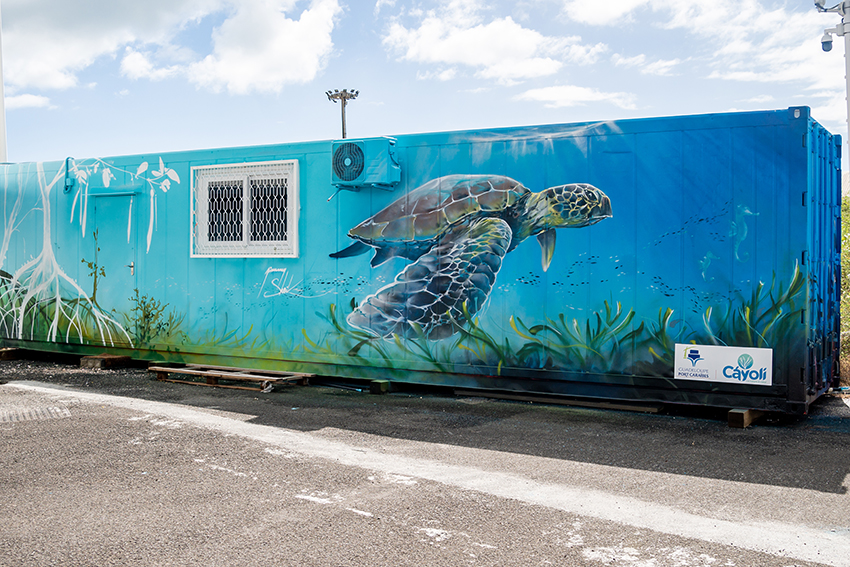
9 Dec, 2018 | Cáyoli
Assisted by specialists, Guadeloupe Port Caraïbes is setting up a farm to raise post-larvae of coastal fish. Captured in the wild by fishermen, the larvae are reared until they reach a “refuge” size that allows them to escape predation.
A SOLUTION TO BOOST COASTAL FISH POPULATIONS
The main challenge of the environmental program is to act on the state of health of habitats. The main idea is that when environments are healthy and functional, species reinstall to them. However, Guadeloupe Port Caraïbes wished to work also on certain coastal species in order to boost the fishing resources.
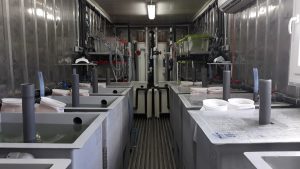
AN INNOVATIVE SYSTEM IN THE EXPERIMENTATION PHASE
Globally, this rearing is based on the capture of larvae in a pelagic environment by professional fishermen specially trained for this type of fishing. The captured larvae are installed in the rearing farm where they will spend a few weeks. Once the “refuge” size is reached, they are returned to the natural environment after a short adaptation period.
Within the framework of Cayoli, this device is in test period. A first experimentation has already been carried out at the beginning of December. It allowed the release of more than 800 fish and shellfish in the Petit-Cul-de-Sac-Marin !
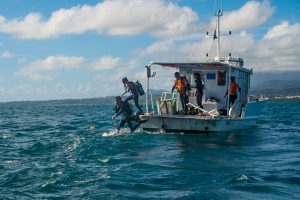
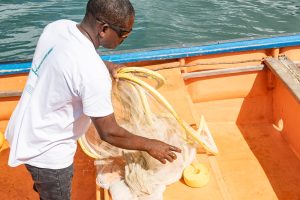

24 Nov, 2016 | Cáyoli
Each year, the Ministry of Ecological and Solidarity Transition rewards companies that develop innovative and environmentally friendly practices. And Cáyoli is one of the 14 national winners for 2016!
With the Special Jury Prize, the Ministry salutes the commitment of Guadeloupe Port Caraïbes in the category “Business and Biodiversity”. It is the ambition and quality of the Cáyoli program that convinced the jury at the end of a presentation made by Mrs. Sita NARAYANAN, head of the Environment and Sustainable Development Department.
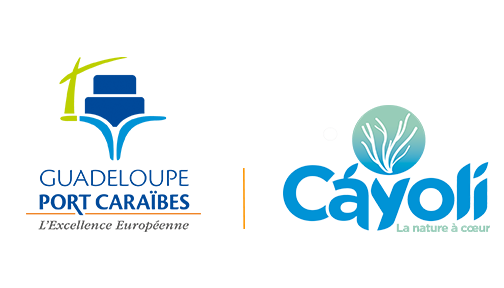
3 Jun, 2016 | Cáyoli
Cáyoli is the commitment of Guadeloupe Port Caribbean to maintain the balance and preserve the environment on its natural spaces. In a pragmatic way, it is a matter of implementing concrete actions for the preservation and active restoration of biodiversity.
A MANAGEMENT PLAN FOR NATURAL AREAS?
The activities of Guadeloupe Port Caribbean are spread over 5 sites: Jarry, Pointe-à-Pitre, the Marina of Bas-du-Fort, Basse-Terre and Folle-Anse de Marie-Galante. The port district, which is divided over the Guadeloupean territory, is home to diversified ecosystems with definite environmental issues.
Cáyoli is conducted through a global approach to environmental issues. Ecosystems should not be seen as segmented spaces: it is also the connection between them that must be restored, preserved and maintained.
This interdependence of environments essential for the survival of species is fully expressed in the notion of ecological corridors : whether it concerns fauna or flora, terrestrial or marine, it takes on different realities (depending on whether these corridors serve as habitats, filters, or conduits for the propagation of species) but highlights the need for functional links between ecosystems or between different habitats of a species to enable its survival.
Guadeloupe Port Caribbean initiates a valorization of sites in particular in:
- Restoration of natural environments;
- Restoring the functionality of wetlands and shallow coastal areas ;
- Recreating and repopulating ecological habitats ;
- Making certain natural sites accessible and offering new services to local residents;
- Creating employment through the transfer of skills and the socio-economic development of certain natural areas
THE GUIDING PRINCIPLES
The global approach is central in the elaboration of Cáyoli, the social and economic dimensions are the basis for the construction of the program.
- Working in partnership in a dynamic of consultation with the actors
- Anchoring actions in a long time frame (planning over the next 15 years)
- Promote the coherence of ecological corridors
- The environment is a broad concept, encompassing issues ranging from the preservation of biodiversity to the improvement of the living environment
- Integrate the Avoid, Restore and Preserve sequence from the design stage of port development projects
- Within the port district, promote the establishment of economic activities with an environmental added value







